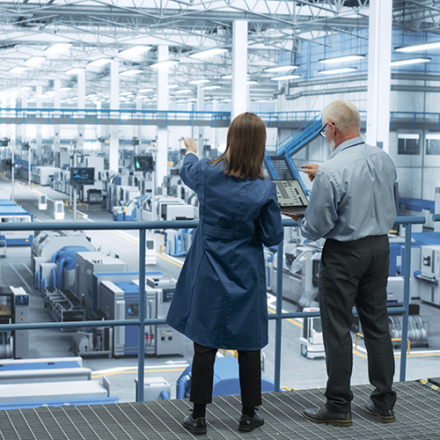Dell Technologies is not only the number one essential technology vendor across several products and services categories, it is also one of the largest manufacturers in the world. As a result, we deeply understand the way in which the sector is influenced by technological trends, and the challenges and opportunities that this can present.
If you consider the major technological mega-trends we are seeing today, such as Edge computing, 5G, robotics, augmented and virtual reality, enhanced cybersecurity measures, and of course, artificial intelligence (AI), We have relevance across the board. Together with our broad ecosystem of partnerships, we can help our manufacturing customers accelerate and de-risk their approach to digital transformation.
With the breadth of our portfolio and the extent of our capabilities, we can help with modernising our manufacturing customers’ environments, from enterprise resource planning and product lifecycle management systems, all the way down to industrial control systems and connected assets on the factory floor.
Understanding the Innovation Loop
If we think about the impact of technology on accelerating innovation in any business, we have to start with two fundamental questions: what business problems are we trying to address, and what use cases are we trying to bring to life?
The pace of change and technological innovation is exponentially accelerating, and therefore we have to embrace this and take advantage of it.
At a very basic level we can break down the process of addressing the above questions to three key areas:
- Do we have access to the right data and can it be sensed and captured in a timely manner?
- Can we apply some form of workload or analytics to the data?
- And can we generate insights and actionable outcomes in order to drive value for the organisation?
I refer to this three step process as the ‘innovation loop’. The faster that you go around this perpetual loop, the more quickly you can build value and competitive differentiation for your organisation.
But how quickly you go around this loop very much depends on how you organise your teams, how you construct your digital supply-chain, and how you closely you align your technology acquisition strategy to your board level priorities.
Adopting a unified approach, to break down digital and organisational silos, to rationalise architectural diversity and to reduce complexity across the board is going to be essential.

Creating Value at the Edge
The edge can mean different things to different people, but from our perspective, The Edge is the intersection of the digital and physical worlds, where data is processed close to the point it is generated, enabling immediate and essential value to be gained, and timelier, business critical decisions to be made. In the context of the manufacturing industry, this is often the smart factory floor. Manufacturers are leveraging edge computing to design smart factories where production processes are streamlined, and decisions are made in real-time based on accurate data analysis.
This puts manufacturing at the forefront of innovation. But this is nothing new. The manufacturing industry has a rich history of embracing technological advancements. From the first industrial revolution driven by power generation, to the current era of smart, connected, and autonomous digital and physical technologies and robotics, which has been described as the “fourth industrial revolution”.
Some argue, however, that with advancements in AI, we are now entering a fifth industrial revolution, or Industry 5.0, characterised not by AI on its own, but its integration with the crucial human strengths of problem solving and creativity. It is about the next era of human-machine partnerships.
The pace of change and technological innovation is exponentially accelerating, and therefore we have to embrace this and take advantage of it.
In manufacturing, we are already seeing automatically reconfigured production lines. We are experiencing AI- driven self-healing systems that can anticipate failures. AI enabled platforms and data driven approaches to design and manufacturing, is accelerating product improvement timelines and lifecycle management. Keeping up with the pace of innovation and change, is essential for manufacturers to stay relevant and competitive.
Overcoming supply chain challenges
However, supply chain complexity remains one of the biggest challenges within the manufacturing sector. At Dell Technologies, we’ve adopted a data driven approach to maintaining the resiliency of our supply chain, which was particularly important during the stressed market conditions of the pandemic. We overcame those challenging market conditions by adopting a robust data driven approach to managing our manufacturing supply chain end to end. Our sophisticated demand signals, combined with sound market data, allowed us to anticipate issues and proactively remove potential bottlenecks. This allowed us to meet the accelerated demand for our products and services. This is made possible through adopting a unified approach to data management. We are determined and committed to continuously reducing our technical debt, and to align our teams strategically such that we are accelerating innovation and time to outcomes, not only for ourselves but also for our valued customers.
For example, Industrial Internet of things (IIOT) can deliver huge benefits to supply chain visibility, through better monitoring of the location and condition of assets. Sensors can measure temperature, humidity, pressure, location, and movement. Using data driven insights, we can proactively prevent potential failures in the supply chain and take a more agile approach to risk management.
Another exciting innovation leveraging data driven insights is the use of digital twins, or virtual replicas of physical systems. These digital models allow manufacturers to monitor, analyse, and optimise their operations in real-time, by simulating various scenarios, enabling manufacturers to make informed decisions without physically altering their systems.
Together with our ecosystem of partnerships, we can reduce the cost and risk associated with implementing these solutions, leading to outcomes such as improved operational efficiency, reduced downtime, increased throughput and enhanced product quality.

Building a Stronger Ecosystem
The manufacturing industry stands on the brink of a new era, driven by AI and emerging technologies. From edge computing and digital twins to generative AI and collaborative innovation, these advancements are reshaping the industry and creating new opportunities for growth.
At Dell Technologies, we aim to share our own experiences as a manufacturer with our customers within the sector. To help organisations modernise not only their traditional IT environments and product lifecycle management capabilities, we also work with our broad ecosystem of partnerships, who help us to deliver unified solutions for smart factories and connected industrial control systems.
At this point, you may have two key questions. How do I start? And where do I start from? In order to help you rapidly build a high-level overview of your transformation strategy, I would like to suggest our fee waived accelerator workshop to start your journey around accelerating innovation in your organisation. Find out more explore here and here.


